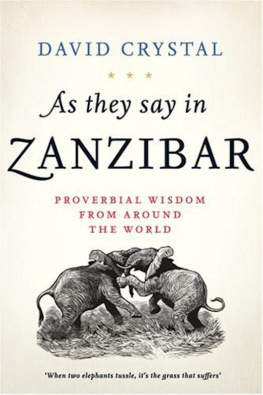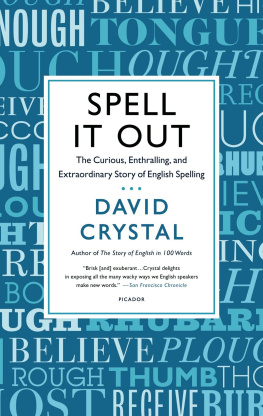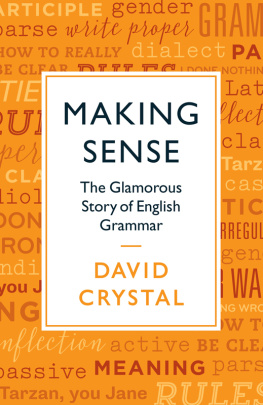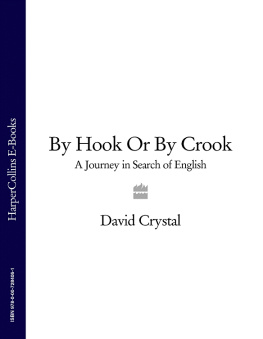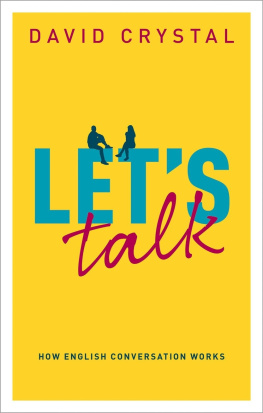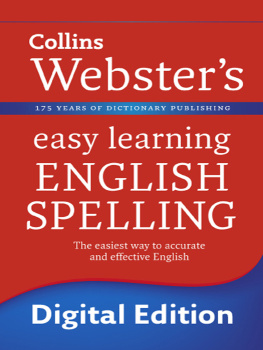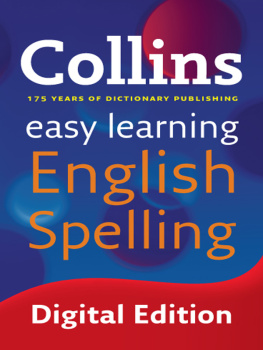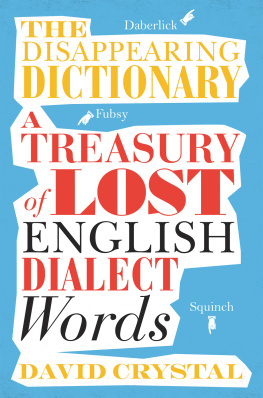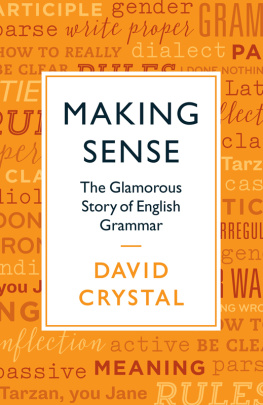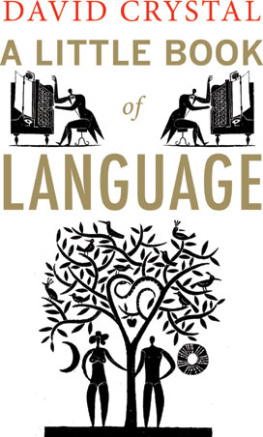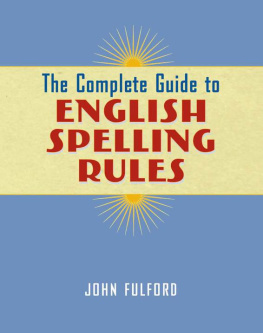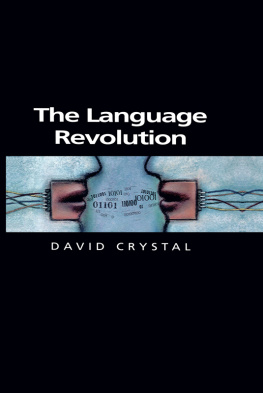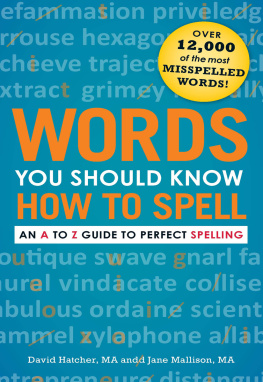Spell it out
Also by David Crystal
The Cambridge encyclopedia of language
The Cambridge encyclopedia of the English language
The stories of English
The fight for English
Think on my words: an introduction to Shakespeares language
Txting: the gr8 db8
By hook or by crook: a journey in search of English
A little book of language
Evolving English: one language, many voices
Begat: the King James Bible and the English language
Internet linguistics
Just a phrase Im going through: my life in language
The story of English in 100 words
Spell it out:
the singular story of English spelling
David Crystal

First published in Great Britain in 2012 by
PROFILE BOOKS LTD
3A Exmouth House
Pine Street
London EC1R 0JH
www.profilebooks.com
Copyright David Crystal, 2012
10 9 8 7 6 5 4 3 2 1
Printed and bound in Great Britain by Clays, Bungay, Suffolk
The moral right of the author has been asserted.
All rights reserved. Without limiting the rights under copyright reserved above, no part of this publication may be reproduced, stored or introduced into a retrieval system, or transmitted, in any form or by any means (electronic, mechanical, photocopying, recording or otherwise), without the prior written permission of both the copyright owner and the publisher of this book.
A CIP catalogue record for this book is available from the British Library.
ISBN 978 1 84668 567 5
eISBN 978 1 84765 822 7

The paper this book is printed on is certified by the 1996 Forest Stewardship Council A.C. (FSC). It is ancient-forest friendly. The printer holds FSC chain of custody SGS-COC-2061
Contents
Introduction
I have wanted to write a book on English spelling all my life, but the prospect has always scared me. There is simply so much of it. With well over a million words in English, affected in myriad ways by some 1,300 years of history, the task of attempting to find some order in the chaos, as linguists like to do, seemed well nigh impossible. In 2005 I compiled a Pocket Spelling Dictionary for Penguin Books, and that reinforced my feeling about the vast scale of any such enterprise.
What has changed is that sophisticated tools to help carry out this task have now become available. Chief among these is the online Oxford English Dictionary, which makes it possible to see the spelling history of any word at the click of a mouse. And two huge item-by-item surveys have taken place the first by Edward Carney, published in 1994 as A Survey of English Spelling; the second by Christopher Upward, published in 2011 in association with George Davidson as A History of English Spelling. It was my privilege to edit the latter book as part of the Blackwell/Wiley Language Library, and it was in the course of this exercise that I began to realise that most of the required hard linguistic graft the collection and arrangement of copious examples, letter by letter, period by period had been done.
Bridges now need to be built between this solid academic linguistic foundation and the curiosity of the general English-using public, whose common cry in this connection is Why on earth is spelled like that? A huge number of words can fill that blank, and this book deals with quite a few of them. The bridges are especially needed by teachers, who have the unenviable task of introducing their students to the English orthographic world. The student constituency is twofold: children learning to read and write English as a mother-tongue; and the vast number of children and adults who are learning English as a foreign language. The complaint from all of them resounds around the globe: can anything be done to facilitate the task of learning to spell English words? I believe the answer is yes, though a new pedagogy will take a while to implement. The present unsatisfactory teaching situation is the result of several centuries of evolution, and it will take some time to replace this by a more efficient approach based on sound linguistic principles. I make some suggestions about such an approach in the final two chapters of the book.
Nowhere is the old saying I cant see the wood for the trees more applicable than in the case of spelling. We are dealing with thousands of words whose orthographic character has been shaped by sets of factors that often defy generalisation. We search for rules, and just when we think we have found some, we encounter a host of anomalies, variations and exceptions. How, under these circumstances, do we find a road map to take us through the spelling wood?
I believe the best way into the wood is chronological. To understand the complexity of English spelling, we first have to understand when and how the language was originally written down. So our story begins with the Anglo-Saxon monks, using our knowledge of Modern English to give us a sense of the scale of the task they faced ().
The Middle English period, from the 12th to the 15th centuries, is hugely different from its Old English predecessor. Thousands of words entered the English language, especially from French and Latin, and they all had to be spelled. Words began to influence each other in unexpected ways ().
Since the 17th century, people have searched for other ways of coping with the vagaries of English spelling. Some have put their faith in rules (chaos, as we look towards the future. And for teachers, I argue in two appendices, this perspective is essential.
1
The nature of the problem
English spelling is difficult, but it is not as chaotic as is often claimed. An explanatory perspective can make the learning of spelling easier.
Why is English spelling so difficult? Why do we have spelling bees and competitions? Why do children spend so much time learning lists of spellings off by heart? Why do so many people feel they are bad at spelling, and worry so much about it? And why are good spellers so proud of their achievement that, when they see a misspelling, they condemn the writer as sloppy, careless, lazy or uneducated?
Spelling is evidently important. Society says so. When people notice spelling mistakes in a newspaper or poster, they react with emotions ranging from mild amusement to horrified disgust. Publishers employ proofreaders to prevent such things happening. Some employers have told me that if they see a job application with spelling mistakes, it goes into the bin straight away. We are under similar pressures online: to access an Internet address, we have to get the spelling exactly right.
Society expects us to spell perfectly. And yet we are all aware that there are some words in the language that we dont know how to spell, and have to look them up before we write them. There are no exceptions. Nobody knows how to spell every word in the language. Even the brilliant spellers who win the prizes in spelling bees get some words wrong.
People provide aids to help us achieve that perfection: dictionaries and spelling checkers. But there are problems with both. To look a word up in a dictionary, we have to know how to spell it which rather defeats the purpose of the exercise. Well find it eventually, of course, but it isnt the most obvious way to deal with the difficulty. And spelling checkers are useful only to a limited extent. They spot spellings that dont exist; but they wont highlight a word if its misspelled yet does exist. The first two stanzas of an ode to a spelling checker, by Mark Eckman and Jerrold H. Zar, illustrate the problem:
Next page

